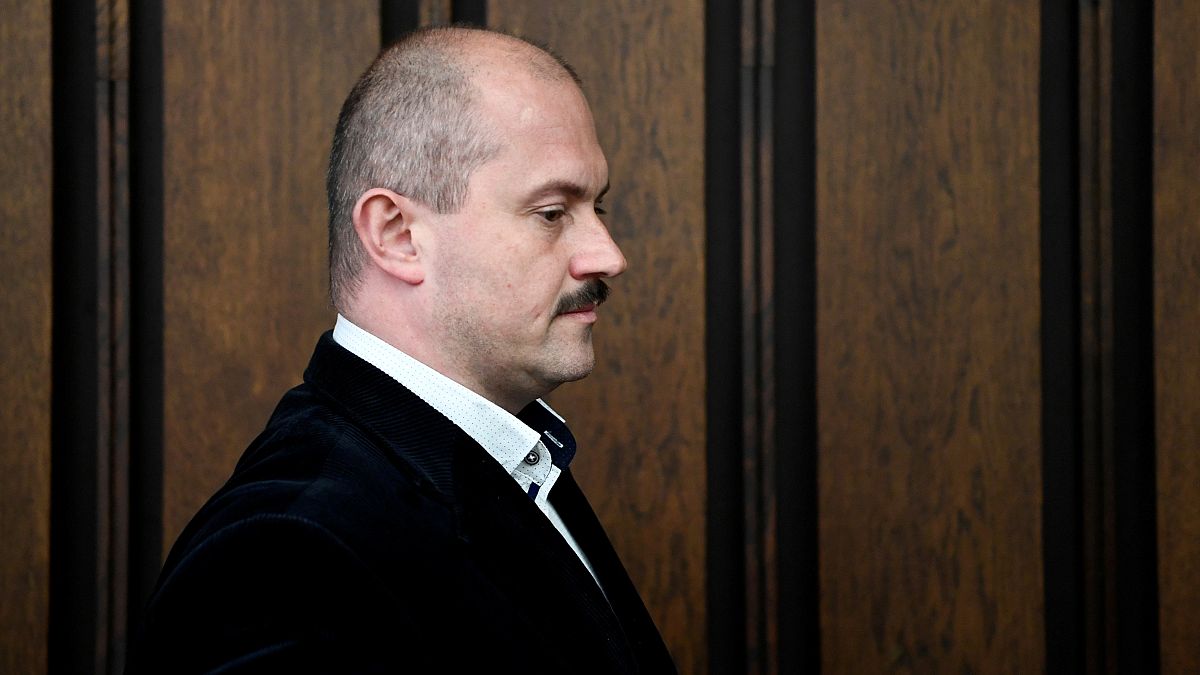Slovakia’s far right have been edging upwards in the polls, with around 14% of the vote, only 5% behind the ruling social-conservative Direction-Social Democracy (Smer-SD) party.
There’re many things Lucia Žužová admires about Marian Kotleba (pictured), the 42-year-old leader of the People’s Party Our Slovakia (L’SNS), who many consider to be a neo-fascist.
"Common sense, integrity, high moral standards," Žužová told Euronews, but, above all, "I truly believe he is blessed by God."
With or without God’s support, Slovakia’s far right has been edging upwards in the polls, so it would not come as a great surprise if it ranked second in the European Parliament elections on May 25.
Recent polls show them with around 14% of the vote, only 5% behind the ruling social-conservative Direction-Social Democracy (Smer-SD) party.
Žužová, a pro-life activist, who is standing for election with L’SNS, is not the only one bestowing a God-like status on Kotleba.
Touting migration and LGBT rights as dangerous for Slovakia's national identity, Kotleba has attracted many who feel disillusioned with the country's elites — whether embodied by the European Union, Smer-SD, independent president Andrej Kiska, or his successor the anti-corruption activist Zuzana Čaputová.
The latter, a progressive newcomer, won the presidential election in March amid deep discontent with widespread corruption, murky relations between politicians and businessmen, and poor public services, all of which are widely associated with the ruling party.
One of the symptoms of this mass fatigue is the fact that people have long kept away from the ballot boxes during EU elections. For instance, in the last three in 2004, 2009 and 2014, Slovakia trailed behind every other country in terms of turnout with only 17%, 20% and 13% casting their votes respectively.
Paradoxically, “Kotleba’s voters follow the same emotion: they want change,” Juraj Marušiak, a political scientist at the Slovak Academy of Sciences, told Euronews. “But for them people like Čaputová are like another brick in the liberal wall established in 1989.”
Like many far-right leaders in Europe, Kotleba, until recently the mayor of his hometown Banská Bystrica, has rebranded himself from showing the image of an angry tribune to a more calculated politician.
His doctrine, however, remained the same, something he himself guaranteed in 2014. "I’m the same Kotleba as I was, and will be forever," he reassured his supporters.
Asked about Kotleba’s views, Miloš Zverina, a publisher and L’SNS candidate in the European elections, told Euronews he would never join an "extreme" party but said he endorsed Kotleba as an aspiring strongman: “If the liberal democracy had worked well, we wouldn’t need an iron fist,” he said. “But, as we see, it hasn’t.”
Ivan Štefunko, whose party Progressive Slovakia nominated Zuzana Čaputová to run for office and is now polling in third place, warned that Kotleba is currently "the greatest evil in Slovak politics."
"It is the government who opened the door to him," Štefunko said, arguing that after the brutal murder of investigative journalist Ján Kuciak and his fiancée last February – a murder which triggered mass demonstrations and forced the government to resign – the ruling Smer-SD turned to the right in order to stop the decline in support.
READ MORE: Jan Kuciak murder: how has journalist's slaying changed Slovakia?
Since his party entered the parliament in 2016 with 14 seats, Kotleba has been boycotted by all the other parliamentary groups but now, together with Smer-SD, he got a move to cap the country's retirement age through parliament and was invited for private talks with the interior minister.
Marek Mach, a 17-year-old high school student, is worried that Kotleba becoming more mainstream may contribute to growth in support, especially among the youngsters, who have long been his loyal base. As many as 20% of citizens aged 18 to 24 said they think he is the best option for Slovakia, according to a poll from November 2018.
"Many from my generation are frustrated, but they don’t ask questions and are not interested in politics. They just follow the person who gives the simplest answers," Mach, who founded the Youth Against Fascism initiative, told Euronews.
"We learn about fascism at school, but no one really imagines it could happen again,” he said. “If we allow it, anything could happen again.”
